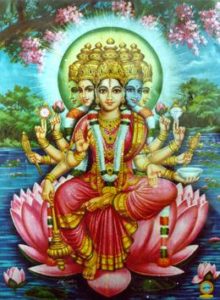 Gāyatrī is a chandas, a vedic meter, designed with 24 syllables (phonemes) and having three pada (feet) each having eight syllables. This conception of gāyatrī is based on (a) the standard mantra pada which is of eight syllables called aṣṭākṣarī. This is the simplest form of the mantra-pada. स-स-व-द प-र-र-ज | sa-sa-va-da pa-ra-ra-ja and (b) the fact that Agni devatā, the deva of bhū-loka (earth plane of consciousness) has three legs. [ॐ भूर् अग्नये स्वाहा | om bhūr agnaye svāhā]
Gāyatrī is a chandas, a vedic meter, designed with 24 syllables (phonemes) and having three pada (feet) each having eight syllables. This conception of gāyatrī is based on (a) the standard mantra pada which is of eight syllables called aṣṭākṣarī. This is the simplest form of the mantra-pada. स-स-व-द प-र-र-ज | sa-sa-va-da pa-ra-ra-ja and (b) the fact that Agni devatā, the deva of bhū-loka (earth plane of consciousness) has three legs. [ॐ भूर् अग्नये स्वाहा | om bhūr agnaye svāhā]
Each leg is pointed at a direction of 120° from the other. Together, the three legs cover the 360° of the geo-centric zodiac. These feet are exactly at 0°, 120° and 240° of the zodiac which are the gaṇḍānta points. When any planet is at these junctions, it is subject to destruction under the feet of Agni devatā. We speak about gaṇḍānta at the Sivananda Ashram 15th Annual Vedic Astrology Conference. Suffice is to say that we need mantra(s) that would prevent various types of destruction under the terrible flames of Agni at the gaṇḍānta. These mantra are in the gāyatrī chandas, which alone is most adored by Agni Devatā, and are from the Mahānārāyaṇa Upaniṣad. Unlike the gāyatrī of the Ṛk Veda which require initiation to function, these mantra shall work by the mere recitation.
These gāyatrī are based on the kavacha mantra of the devatā. For example, consider the Nārāyaṇa Kavacha which is composed of three nāma mantra –
ॐ नमो नारायणाय | om namo nārāyaṇāya à nāma ‘Nārāyaṇa’
ॐ विष्णवे नमः | om viṣṇave namaḥ à nāma ‘Viṣṇu’
ॐ नमो भगवते वासुदेवाय | om namo bhagavate vāsudevāya à nāma ‘Vāsudeva’
These three names are used in the Nārāyaṇa Gāyatrī as taught in the Mahānārāyaṇa Upaniṣad. Just as the three nāma-mantra of the Nārāyaṇa Kavacha can protect the brāhmaṇa (Jupiter) from false allegations and every kind of evil, so also the Nārāyaṇa gāyatrī protects when Jupiter passes through gaṇḍānta.
नारायणाय विद्महे वासुदेवाय धीमहि।
तन्नो विष्णुः प्रचोदयात्॥ २९॥
nārāyaṇāya vidmahe vāsudevāya dhīmahi |
tanno viṣṇuḥ pracodayāt || 29||
| Devatā Nāma | Gāyatrī [Mahānārāyaṇa Upaniṣad] |
| tatpuruṣa mahādeva rudra |
तत्पुरुषाय विद्महे महादेवाय धीमहि। तन्नो रुद्रः प्रचोदयात्॥ २३॥ tatpuruṣāya vidmahe mahādevāya dhīmahi | tanno rudraḥ pracodayāt || 23|| |
| tatpuruṣa vakratuṇḍa danti |
तत्पुरुषाय विद्महे वक्रतुण्डाय धीमहि। तन्नो दन्तिः प्रचोदयात्॥ २४॥ tatpuruṣāya vidmahe vakratuṇḍāya dhīmahi | tanno dantiḥ pracodayāt || 24|| |
| tatpuruṣa cakratuṇḍa nandi |
तत्पुरुषाय विद्महे चक्रतुण्डाय धीमहि। तन्नो नन्दिः प्रचोदयात्॥ २५॥ tatpuruṣāya vidmahe cakratuṇḍāya dhīmahi | tanno nandiḥ pracodayāt || 25|| |
| tatpuruṣa mahāsenā ṣaṇmukha |
तत्पुरुषाय विद्महे महासेनाय धीमहि। तन्नः षण्मुखः प्रचोदयात्॥ २६॥ tatpuruṣāya vidmahe mahāsenāya dhīmahi | tannaḥ ṣaṇmukhaḥ pracodayāt || 26|| |
| tatpuruṣa suvarṇapakṣī garuḍa |
तत्पुरुषाय विद्महे सुवर्णपक्षाय धीमहि। तन्नो गरुडः प्रचोदयात्॥ २७॥ tatpuruṣāya vidmahe suvarṇapakṣāya dhīmahi | tanno garuḍaḥ pracodayāt || 27|| |
| vedātman hiraṇyagarbha brahma |
वेदात्मनाय विद्महे हिरण्यगर्भाय धीमहि। तन्नो ब्रह्म प्रचोदयात्॥ २८॥ vedātmanāya vidmahe hiraṇyagarbhāya dhīmahi | tanno brahma pracodayāt || 28|| |
| पाठभेदः pāṭhabhedaḥ caturmukha kamaṇḍaludhara brahmā |
चतुर्मुखाय विद्महे कमण्डलुधराय धीमहि। तन्नो ब्रह्मा प्रचोदयात्॥ caturmukhāya vidmahe kamaṇḍaludharāya dhīmahi | tanno brahmā pracodayāt || |
| nārāyaṇa vāsudeva viṣṇu |
नारायणाय विद्महे वासुदेवाय धीमहि। तन्नो विष्णुः प्रचोदयात्॥ २९॥ nārāyaṇāya vidmahe vāsudevāya dhīmahi | tanno viṣṇuḥ pracodayāt || 29|| |
| vajranakha tīkṣṇadaṁṣṭra narasiṁha |
वज्रनखाय विद्महे तीक्ष्णदंष्ट्राय धीमहि। तन्नो नारसिंहः प्रचोदयात्॥ ३०॥ vajranakhāya vidmahe tīkṣṇadaṁṣṭrāya dhīmahi | tanno nārasiṁhaḥ pracodayāt || 30|| |
| bhāskara mahaddyutikara āditya |
भास्कराय विद्महे महद्द्युतिकराय धीमहि। तन्नो आदित्य्यः प्रचोदयात्॥ ३१॥ bhāskarāya vidmahe mahaddyutikarāya dhīmahi | tanno ādityyaḥ pracodayāt || 31|| |
| पाठभेदः pāṭhabhedaḥ āditya sahasrakiraṇa bhānu |
आदित्याय विद्महे सहस्रकिरणाय धीमहि। तन्नो भानुः प्रचोदयात्॥ ādityāya vidmahe sahasrakiraṇāya dhīmahi | tanno bhānuḥ pracodayāt || |
| vaiśvānaraya lālīla agni |
वैश्वानरय विद्महे लालीलाय धीमहि। तन्नो अग्निः प्रचोदयात्॥ ३२॥ vaiśvānaraya vidmahe lālīlāya dhīmahi | tanno agniḥ pracodayāt || 32|| |
| पाठभेदः pāṭhabhedaḥ pāvaka saptajihva vaiśvānara |
पावकाय विद्महे सप्तजिह्वाय धीमहि। तन्नो वैश्वानरः प्रचोदयात्॥ pāvakāya vidmahe saptajihvāya dhīmahi | tanno vaiśvānaraḥ pracodayāt || |
| kātyāyani kanyākumāri durgi |
कात्यायनाय विद्महे कन्याकुमारि धीमहि। तन्नो दुर्गिः प्रचोदयात्॥ ३३॥ kātyāyanāya vidmahe kanyākumāri dhīmahi | tanno durgiḥ pracodayāt || 33|| |
| पाठभेदः pāṭhabhedaḥ mahāśūlini mahādurgā bhagavatī |
महाशूलिन्यै विद्महे महादुर्गायै धीमहि। तन्नो भगवती प्रचोदयात्॥ mahāśūlinyai vidmahe mahādurgāyai dhīmahi | tanno bhagavatī pracodayāt || |
| पाठभेदः pāṭhabhedaḥ-2 subhagā kamalamālini gaurī |
सुभगायै विद्महे कमलमालिन्यै धीमहि। तन्नो गौरी प्रचोदयात्॥ subhagāyai vidmahe kamalamālinyai dhīmahi | tanno gaurī pracodayāt || |
| navakula viṣadanta sarpa |
नवकुलाय विद्महे विषदन्ताय धीमहि। तन्नः सर्पः प्रचोदयात्॥ navakulāya vidmahe viṣadantāya dhīmahi | tannaḥ sarpaḥ pracodayāt || |
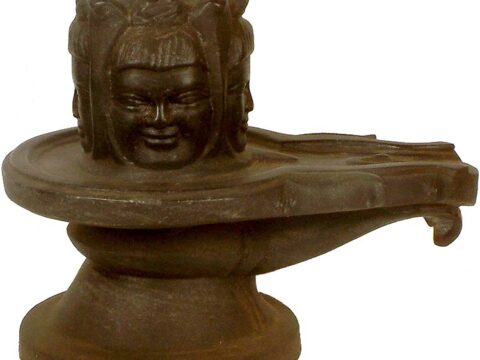
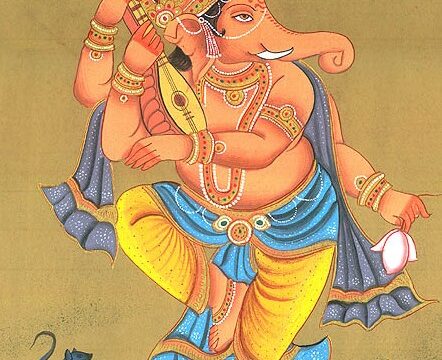

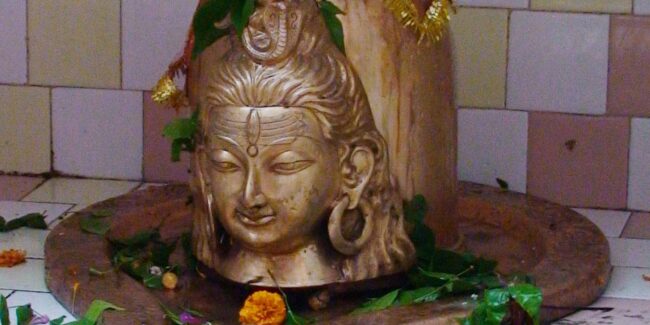

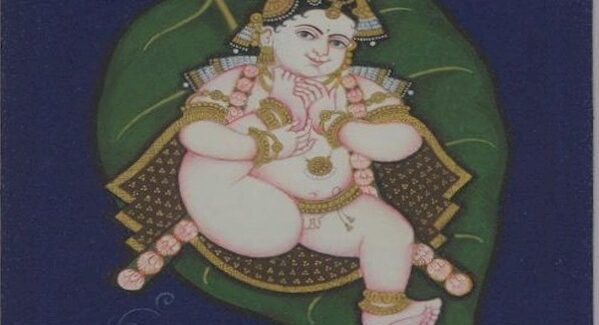
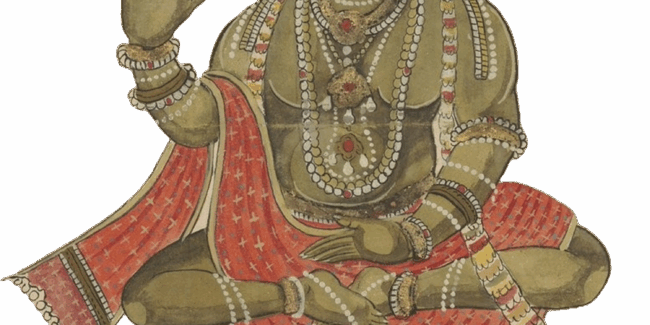
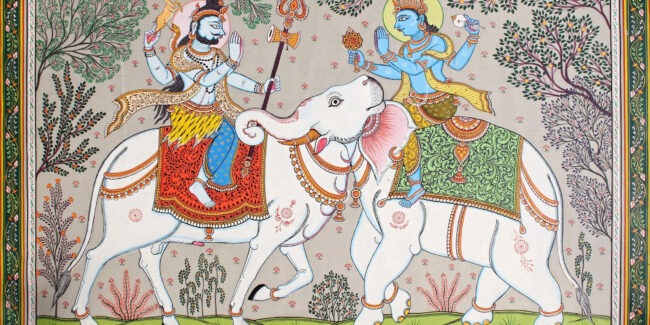
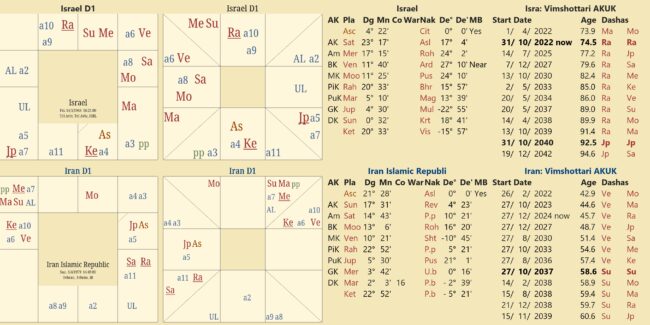
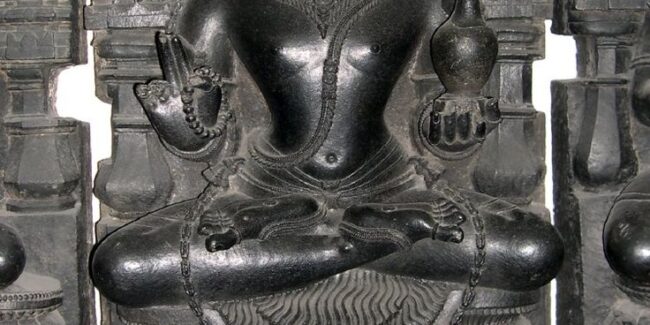
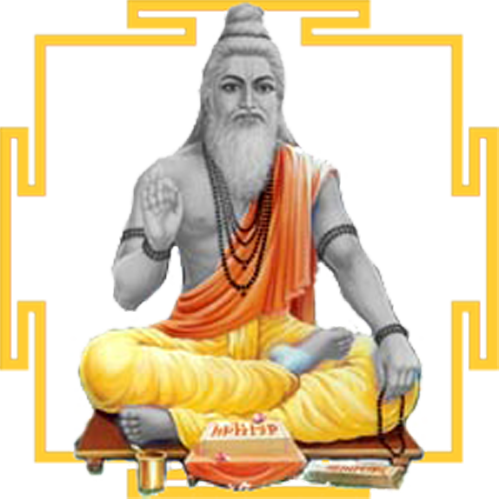 DBC offers online courses in jyotish (Vedic Astrology) taught directly by Sanjay Rath as per the tradition, through narrated power points and other audio tools. The courses are at different levels, from the beginners through the intermediate to the advanced and are known as SoHamsa | DBC courses, with individual classrooms and assistant teachers
DBC offers online courses in jyotish (Vedic Astrology) taught directly by Sanjay Rath as per the tradition, through narrated power points and other audio tools. The courses are at different levels, from the beginners through the intermediate to the advanced and are known as SoHamsa | DBC courses, with individual classrooms and assistant teachers
 Sagittarius Publications is the publisher and distributor the popular quaterly magazine the Jyotish Digest, as well as many thorough books on the subject of Vedic Astrology or Jyotish.
Sagittarius Publications is the publisher and distributor the popular quaterly magazine the Jyotish Digest, as well as many thorough books on the subject of Vedic Astrology or Jyotish. We have an excellent pandit Divākar ‘Deva’ Mishra, who is from the priests of Vindhyāvāsini Siddha Pīṭha to guide you through the hundreds of temples of Kāśi [Varanasi] and neighbouring regions. He can organise your pūjā, keep you safe and take care. He is supported by an English-speaking well-travelled spouse ‘Supriya Mishra’. Please contact them directly for any services, remedial pūjā and tours. They handled the 60+ member Kāśi Jyotiṣa Group 2022.
We have an excellent pandit Divākar ‘Deva’ Mishra, who is from the priests of Vindhyāvāsini Siddha Pīṭha to guide you through the hundreds of temples of Kāśi [Varanasi] and neighbouring regions. He can organise your pūjā, keep you safe and take care. He is supported by an English-speaking well-travelled spouse ‘Supriya Mishra’. Please contact them directly for any services, remedial pūjā and tours. They handled the 60+ member Kāśi Jyotiṣa Group 2022.
Pranam Sanjayji, Thanks for sharing these mantras. I was wondering how to apply this learning to select the appropriate Gayatri mantra based on planets or lord of eighth house in D-9. Could you please enlighten us ? Pranam Nabatanu